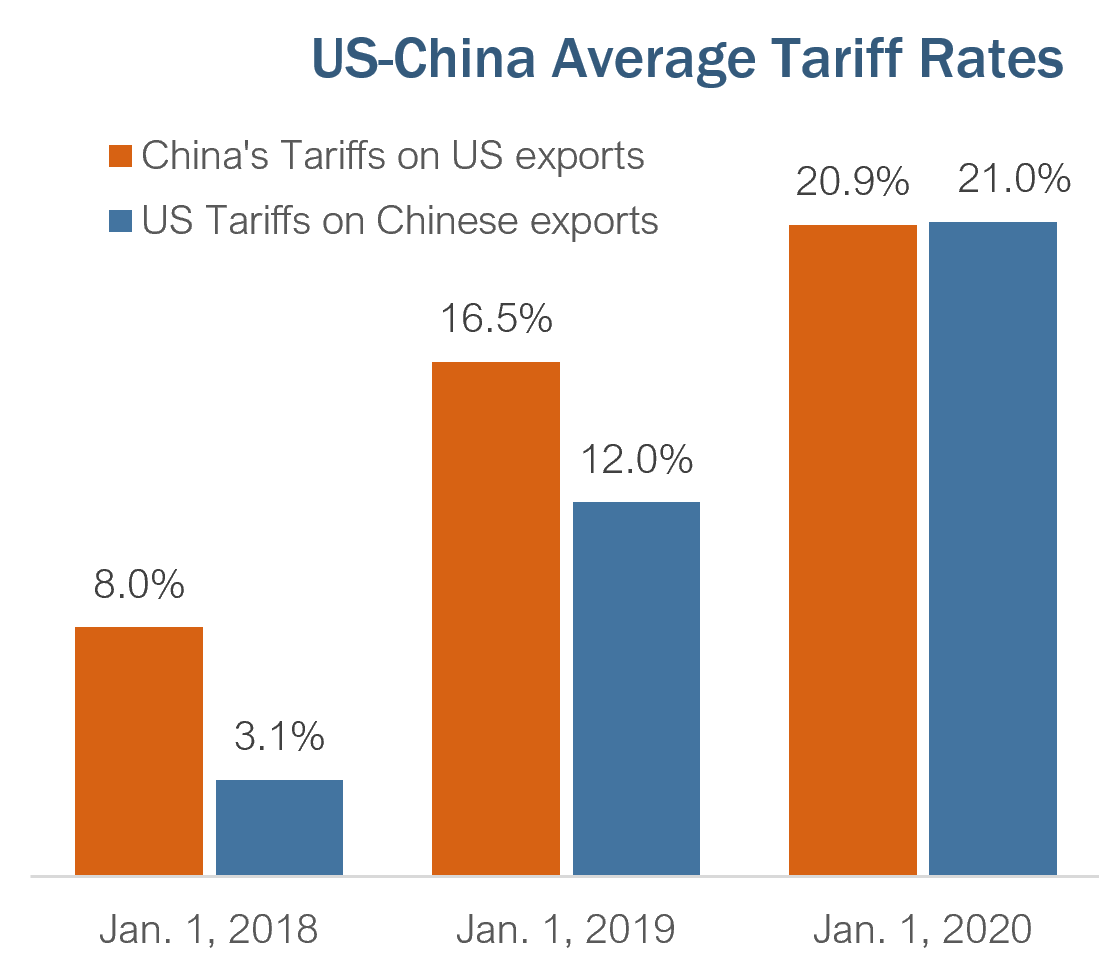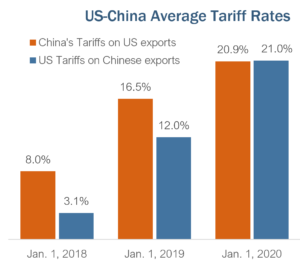

A number of people who are against high taxes believe, at the same time, in substantial tariffs on goods from other countries. Here’s the problem: a tariff is a tax, a tax on imports. Americans and producers in that country share the burden of the tax. And tariffs, like all other taxes, distort people’s decisions in ways that reduce wealth.
This is from David R. Henderson, “A Tariff Is a Tax,” TaxBytes, Institute for Policy Innovation, September 14, 2022.
Another excerpt:
If we buy a good mainly from China, and the U.S. government imposes a tariff on that Chinese good, the good will be more expensive. So, we’ll buy less from China and more from, say, Vietnam. This isn’t just hypothetical. During his time as president, Donald Trump raised tariffs on Chinese goods four times, raising the average U.S. tariff rate on imports from China from 3.1 percent to 21 percent. One result was that imports of manufactured goods from 14 Asian countries were $90 billion higher in 2021 than in 2018, and approximately half of that increase was from Vietnam.
When I did the research for this short piece, I was stunned by the fact that tariff rates on U.S. imports from China increased from 3.1 percent to 21 percent. I guess that’s what can happen when you raise a tax 4 times.
Read the whole thing, which is short.

READER COMMENTS
vince
Sep 16 2022 at 2:42pm
1. Comparative advantage ignores other important issues, such as leaving a country vulnerable to economic sanctions.
2. Tariffs are a means to force negotiations with other countries whose markets aren’t as open as they should be.
3. If free trade were so great–which it is in theory–then why is cheating so common?
Jon Murphy
Sep 16 2022 at 3:07pm
Do you realize your three points are contradictory?
David Henderson
Sep 16 2022 at 4:33pm
You wrote:
How important this is depends on the issue. If the importing country is able to get a particular good from a number of countries, then sanctions by one of those countries won’t impose that much harm. Also, one advantage of depending on other countries is that it limits the home country’s ability to impose price controls. When I was the energy economist with President Reagan’s Council of Economic Advisers, I came across a case from 1981 or 1982 when Turkey’s government tried to impose price controls on oil imports. Guess what happened to oil imports. Turkey’s government relented a week or two later.
You wrote:
True, and they sometimes work. Take a look at the graph above and see what the Chinese government did in response to increases in tariffs. Also, check out the chicken tax, here and here.
You write:
That’s like asking “If getting rid of occupational licensure is so bad, then why do we have it?” The answer is that concentrated interests–people in the profession that’s licensed–tend to push for it. Similarly, people who don’t want to compete with imports push for restrictions on imports.
vince
Sep 16 2022 at 5:45pm
On item 3, concentrated interests certainly is one reason. In some situations, that concentrated interest could be a country itself. For example, a country may hope to become a manufacturing powerhouse in a certain industry, for their own national reasons. Sure, industrial policy has generally been unsuccessful, but that’s a different issue.
Jon Murphy
Sep 16 2022 at 6:16pm
It doesn’t make sense to speak of a country as a “concentrated interest.” It is some industrial interest (who likely is engaging in regulatory capture) but the promotion of some industrial interest must necessarily come at the expense of another within the nation
Matthias
Sep 17 2022 at 6:15am
Unilateral free trade is optimal. Trade agreements are purely about politics.
There’s no way to ‘cheat’ unilateral free trade.
About why both trade agreement and cheating on them are common: look into public choice theory.
David Seltzer
Sep 16 2022 at 5:25pm
Global example of cross elasticities?
Mactoul
Sep 16 2022 at 9:32pm
Was it not a good thing to diversify American imports and not be over-dependent on a single country?
Don’t we see this point made material this year with European dependence on Russian energy?
Matthias
Sep 17 2022 at 6:20am
If you want to encourage people to make preparations for bad times and shocks, you need to allow them to reap the profits of that preparation.
So anti price gauging laws (and similar) do the opposite of encouraging resilience.
Trying to pile up more regulation like tariffs to fix the problems that previous regulations cause rarely works.
(In any case, a policy designed to effectively achieve the goal of diversification would look rather different than the tariffs we’ve got in practice.)
Jon Murphy
Sep 17 2022 at 6:34am
Free trade encourages diversification
S C
Sep 17 2022 at 1:42pm
Then, it may be argued, it’s wiser to trade with a number of nations, and a diversified range of production capacities ( and basket of currencies), rather than literally help just one nation become a manufacturing superpower, because it’s political and administrative systems neatly dovetail with the economic imperatives of a select group of people at any certain point of time.
But that never happened, and here we are. Just. In. Time.
vince
Sep 17 2022 at 1:56pm
Mactoul: Yes. That’s one of the arguments made by those who favor some protectionism.
This discussion reminds me of the saying: What applies in in theory may not apply in practice.
Questions: We’ve had hundreds of billions annually in trade deficits with China since at least 2000. Why has it not reversed? What are they doing with our money? How much do they now have they invested in our companies and real estate … and politicians?
Jon Murphy
Sep 17 2022 at 2:20pm
You want protectionism to combat the ill effects of protectionism? That doesn’t make sense.
As a scientist, this statement has never made sense to me. A theory means to explain what happens in practice. If the practice does not match the theory, then it is a bad theory.
Why would it? Neither theory nor practice predict it would, nor that reversing it is desirable.
Well, first off it’s not “our money.” Once the trade is made, it becomes their money. And they buy American goods/services/assets with it. One way or the other, the money gets invested back into the US economy.
Second, be careful here. You are implying that the trade deficit is a breakdown of theory. But recall that trade balance is an accounting identity, not an economic theory. Nothing about a perpetual trade deficit (or trade surplus) undermines theory.
As an aside, the other day you asked why regulatory capture still persists even though it is well known. Here you have your answer: despite nominally opposing regulatory capture, you are arguing for the very conditions that bring it about.
vince
Sep 17 2022 at 2:43pm
On each of your points, I disagree. Rather than continue with nitpicking, you can have the last word.
Jon Murphy
Sep 17 2022 at 3:04pm
You are welcome to disagree all you want, but everything I have said is a positive statement. You don’t need to let me have the final word; check out any countless writings on international trade and national accounting, from intro economics textbooks to pop econ pieces like Free Trade Under Fire by Douglas Irwin
Jon Murphy
Sep 18 2022 at 12:07pm
The European story does not help you, but actually weakens the case for protectionism.
European energy problems exist not because of free trade, but because of restricted access to trade. Do not forget that the Europeans greatly restrict the market for energy, preferring to rely on green energy and things like that. They have high protectionist barriers on energy. Thus, when once of their sources (Russia) was disrupted, they had few options to turn to because of their restrictions.
Indeed, things would be far worse for Germany and Europe if not for trade. They are (to the extent their protectionism allows) importing energy from the US and other places to make up for the Russian shortfall. Further restrictions will only make the problem worse.
Jose Pablo
Sep 18 2022 at 4:52pm
Where does this “just in case of” diversification idea end up?
The last great war in Europe was with Germany. Can the other European countries trust Germany (or Italy or the UK) as a “reliable” supplier?
And Texas? … what if they declare independence? (Some Texans are willing to)
Could you trust the Southern States as your providers in 1860?
If you follow this “avoiding dependance” (I don’t know what “overdependence” mean, you either depend on or you don’t … you cannot be “over pregnant”) to the very end, you will end up knitting your own clothes and farming your own food.
I very much doubt you are going to be more resilient doing so, but sure you are going to be much poorer and much busier.
Thomas Lee Hutcheson
Sep 16 2022 at 9:42pm
Yes, but an even less understood point is that a tariff is also a tax on exports and a subsidy to all untaxed imports.
Daniel Hill
Sep 17 2022 at 3:00am
And the same people who support making Chinese imports 20% more expensive are mad about 8% inflation.
Comments are closed.